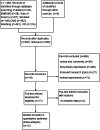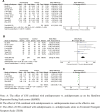Effectiveness and safety of Chaihu-Shugan-San for treating depression based on clinical cases: An updated systematic review and meta-analysis
- PMID: 38941409
- PMCID: PMC11466128
- DOI: 10.1097/MD.0000000000038668
Effectiveness and safety of Chaihu-Shugan-San for treating depression based on clinical cases: An updated systematic review and meta-analysis
Abstract
Background: Chaihu-Shugan-San (CSS), a Traditional Chinese Medicine formula, has been widely used for treating depression since the Ming Dynasty, as recorded in Jingyue Quanshu, but its effectiveness and safety lack comprehensive and objective evaluation. Based on our meta-analysis, we aimed to adequately evaluate the efficacy and risk of CSS by considering the latest clinical literature.
Methods: Multiple databases, including PubMed, Embase, Web of Science, SinoMed, China National Knowledge Infrastructure, Chongqing VIP, and Wanfang, were used to collect clinical data. The quality of the included clinical studies was assessed using the Cochrane Risk of Bias Tool, and the data were meta-analyzed using Review Manager 5.0 and Stata 17. The data were obtained from a genome-wide association study, and Mendelian randomization (MR) was performed using R Software 4.3.2 with the TwoSampleMR and MR Pleiotropy RESidual Sum and Outlier packages.
Results: A total of 15 studies with 1034 patients and 6 antidepressant drugs were included in this work. Meta-analyses revealed that drug combinations of CSS and antidepressants significantly improved depressive symptoms (weighted mean difference = -4.21; 95% confidence interval [CI]: -5.62--2.81), increased the effective rate (odds ratio [OR] = 3.82; 95% CI: 2.44-6.83), and reduced side effects (OR = -3.55; 95% CI: -5.66--1.43) compared with antidepressant monotherapy. Additionally, compared with antidepressant monotherapy, CSS alone exhibited fewer side effects (95% CI:-9.25--6.95). Like antidepressants, CSS also improved depressive symptoms (weighted mean difference = -0.05; 95% CI: -0.63--0.52) and increased the effective rate (OR = 1.07; 95% CI: 0.52-2.20). Additionally, MR was used to evaluate the safety of traditional antidepressants, as there was a causal association between amitriptyline and body mass index.
Conclusion: This analysis demonstrated that compared with traditional antidepressants, CSS combined with antidepressants was more effective and safer for treating depressed patients. MR showed that a causal relationship may exist between amitriptyline and body mass index. Therefore, clinicians should carefully consider the advantages and potential drawbacks of Traditional Chinese Medicine and classic drugs to serve patients better.
Copyright © 2024 the Author(s). Published by Wolters Kluwer Health, Inc.
Conflict of interest statement
The authors have no funding and conflicts of interest to disclose.
Figures
Similar articles
-
Meta-analysis of the clinical effectiveness of traditional Chinese medicine formula Chaihu-Shugan-San in depression.J Ethnopharmacol. 2012 Jun 1;141(2):571-7. doi: 10.1016/j.jep.2011.08.079. Epub 2011 Sep 12. J Ethnopharmacol. 2012. PMID: 21933701 Review.
-
Effects of Chaihu-Shugan-San for reflux esophagitis: A protocol for systematic review and meta-analysis.Medicine (Baltimore). 2020 Dec 4;99(49):e23458. doi: 10.1097/MD.0000000000023458. Medicine (Baltimore). 2020. PMID: 33285744 Free PMC article.
-
The antidepressant-like effects of Chaihu Shugan San: Dependent on the hippocampal BDNF-TrkB-ERK/Akt signaling activation in perimenopausal depression-like rats.Biomed Pharmacother. 2018 Sep;105:45-52. doi: 10.1016/j.biopha.2018.04.035. Epub 2018 May 26. Biomed Pharmacother. 2018. PMID: 29843044
-
Chaihu-Shugan-San, an oriental herbal preparation, for the treatment of chronic gastritis: a meta-analysis of randomized controlled trials.J Ethnopharmacol. 2013 Mar 27;146(2):433-9. doi: 10.1016/j.jep.2013.01.029. Epub 2013 Jan 29. J Ethnopharmacol. 2013. PMID: 23376045
-
Potential antidepressant effects of Traditional Chinese botanical drug formula Chaihu-Shugan-San and its active ingredients.Front Pharmacol. 2024 Apr 2;15:1337876. doi: 10.3389/fphar.2024.1337876. eCollection 2024. Front Pharmacol. 2024. PMID: 38628641 Free PMC article. Review.
Cited by
-
Chaihu-Shugan-San for patients with nonalcoholic fatty liver disease: A systematic review and meta-analysis.Medicine (Baltimore). 2025 May 2;104(18):e42303. doi: 10.1097/MD.0000000000042303. Medicine (Baltimore). 2025. PMID: 40324244 Free PMC article.
-
Traditional Chinese Medicine in the Management of Anxiety Disorders: A Narrative Review of Theoretical Foundations, Clinical Applications, and Modern Integrative Approaches.Neuropsychiatr Dis Treat. 2025 Jun 18;21:1215-1233. doi: 10.2147/NDT.S535646. eCollection 2025. Neuropsychiatr Dis Treat. 2025. PMID: 40548351 Free PMC article. Review.
References
-
- Nistico G, Scapagnini U, Preziosi P. Metabolic changes in depression. Lancet (London, England). 1969;2:159. - PubMed
-
- Van Oudenhove L, Aziz Q. The role of psychosocial factors and psychiatric disorders in functional dyspepsia. Nat Rev Gastroenterol Hepatol. 2013;10:158–67. - PubMed
-
- Crouse JJ, Carpenter JS, Song YJC, et al. . Circadian rhythm sleep-wake disturbances and depression in young people: implications for prevention and early intervention. Lancet Psych. 2021;8:813–23. - PubMed
Publication types
MeSH terms
Substances
LinkOut - more resources
Full Text Sources
Medical




